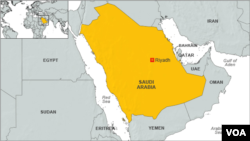The allegations, described as "unfounded" by a Saudi government source, point to a significant escalation of abuses along the perilous route from the Horn of Africa to Saudi Arabia, where hundreds of thousands of Ethiopians live and work.
One 20-year-old woman from Ethiopia's Oromia region, interviewed by HRW, said Saudi border guards opened fire on a group of migrants they had just released from custody.
"They fired on us like rain. When I remember, I cry," she said.
"I saw a guy calling for help, he lost both his legs. He was screaming; he was saying, 'Are you leaving me here? Please don't leave me'. We couldn't help him because we were running for our lives."
HRW researcher Nadia Hardman said "Saudi officials are killing hundreds of migrants and asylum seekers in this remote border area out of view of the rest of the world," according to a statement.
"Spending billions buying up professional golf, football clubs, and major entertainment events to improve the Saudi image should not deflect attention from these horrendous crimes," she said.
A Saudi government source told AFP that the allegations were unreliable.
"The allegations included in the Human Rights Watch report about Saudi border guards shooting Ethiopians while they were crossing the Saudi-Yemeni border are unfounded and not based on reliable sources," said the source, who requested anonymity.
The New York-based rights group has documented abuses against Ethiopian migrants in Saudi Arabia and Yemen for nearly a decade, but the latest killings appear to be "widespread and systematic" and may amount to crimes against humanity, it said.
Last year, United Nations experts reported "concerning allegations" that "cross-border artillery shelling and small-arms fire by Saudi Arabia security forces killed approximately 430 migrants" in southern Saudi Arabia and northern Yemen during the first four months of 2022.
In March that year, repatriation of Ethiopians from Saudi Arabia began under an agreement between the two countries. Ethiopia's foreign ministry said about 100,000 of its citizens were expected to be sent home over several months.
The HRW report said there was no response to letters it sent to Saudi officials.
But the Huthi rebels who control northern Yemen alleged "deliberate killings of immigrants and Yemenis" by border guards, in response to a letter from HRW.
According to the rights group, migrants said Huthi forces worked with people smugglers and would "extort" them or keep them in detention centers where they were "abused" until they could pay an "exit fee."
The Huthis denied working with people smugglers, describing them as "criminals."
In 2015, Saudi officials mobilized a military coalition in an effort to stop the advance of the Iran-backed Huthis, who had seized the Yemeni capital Sanaa from the internationally recognized government the previous year.
Yemen's war has created what the U.N. describes as one of the world's worst humanitarian crises, with millions dependent on aid.
Many of the abuses described by HRW would have occurred during a truce that took effect in April 2022 and has largely held despite officially expiring last October.
The HRW report draws from interviews with 38 Ethiopian migrants who tried to cross into Saudi Arabia from Yemen, as well as from satellite imagery, videos and photos posted to social media "or gathered from other sources."
Interviewees described 28 "explosive weapons incidents" including attacks by mortar projectiles, the report said.
Some survivors described attacks at close range, with Saudi border guards asking Ethiopians "in which limb of their body they would prefer to be shot." the report said.
"All interviewees described scenes of horror: women, men, and children strewn across the mountainous landscape severely injured, dismembered, or already dead," it said.
Other accounts described forced rape and beatings with rocks and iron bars.
HRW called on Riyadh to end any policy of using lethal force on migrants and asylum seekers, and urged the U.N. to investigate the alleged killings.










Forum